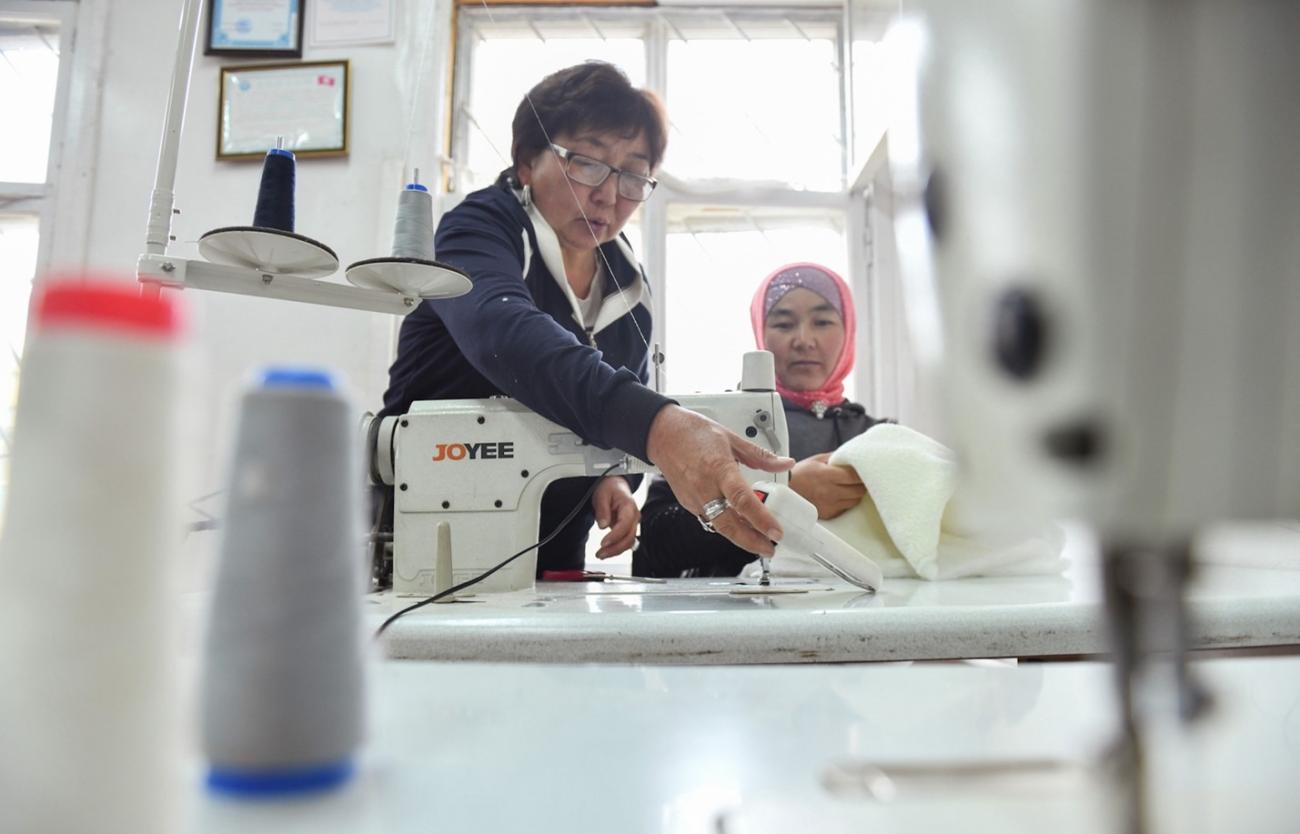Rural Women Can Become Successful Entrepreneurs

The Rural Women's Economic Empowerment (RWEE) Project trains and supports women entrepreneurship in the regions of Kyrgyzstan.
Ms. Elmira Sazanova, a mother of four children and the owner of a small sewing workshop, lives in one of the villages in the At-Bashy rayon of the Naryn oblast.
“Once I dreamed of only two sewing machines, but now I have my own workshop. You need to dream and believe in success, and, of course, work hard,” says Elmira.
There is not much work for women in remote regions of Kyrgyzstan. Often busy with household chores, raising children, and helping their husbands in the household, women stay at home and do not make efforts to develop their own business. For example, the share of women employed in agriculture in Kyrgyzstan is 39.2% of the total number of employed people, while only 20.6% of operating economic entities in agriculture have women as leaders.
However, Elmira was one of those dreamers, but she always believed in success and strived to achieve her goals. Due to lack of work in the 90s, Elmira began to sew robes on her old typewriter and sell them to her neighbors and friends. Then she realized that she could earn money on this business. Though she needed at least a couple of professional sewing machines for full-fledged work, she did not have the funds to buy them.
Four UN agencies – UN Women, FAO, WFP, and IFAD – launched the “Rural Women’s Economic Empowerment” Project aimed at improving food security, promoting income-generating activities, increasing participation in public decision-making, and creating a gender-sensitive culture in society. The programme targets vulnerable rural women and those living below the national poverty line of 2700 KGS a month.
“In 2014, I found out about this project. They told me that they could help with starting a business. To be honest, I did not believe in this, but I still participated in the project, because I was interested, I went to trainings, received a lot of useful information. We have prepared and sent a project to open a sewing workshop. And then one day the sewing machines arrived. And there were so many! I was surprised and confused: what to do with so many sewing machines, where to get the workers? But I overcame my fear and started working,” recalls Elmira.
Of course, it was not without difficulties. First, I had to look for seamstresses, and then orders. Financial difficulties arose because I needed to pay employee salaries, and the villagers could not afford to constantly buy new clothes.
Families of seamstresses opposed to their work. Even Elmira's husband initially discouraged her from her own business, but she did not give up and continued to work, despite all the difficulties. Now the workshop is functioning stably, and over the years dozens of women have worked in it. Elmira hires even in the absence of experience, explaining that almost every woman can be trained in sewing; the main thing is that she has a desire to learn and work.
Now the workshop serves the local population and also sews small batches of orders coming from the capital city.
“We are very friendly here and help each other. We don't even buy clothes for a long time, we sew everything for ourselves, and when someone needs to go over some place, we can quickly sew a beautiful dress with the whole team. Difficulties first arose during the pandemic when orders stopped. But we had accumulated work and, in principle, we did not stop production, and then we began to sew masks, because as you remember that at first there was a shortage and people could not find masks in pharmacies,” Elmira says.
The women are also supported by the local authorities, who have allocated a building for the workshop. The owner of the enterprise notes that the main thing is to start with small steps, to work hard, and then dreams will surely come true.
In this case, of course, family support is important so that women are not forced to quit their jobs halfway. To do this, it is necessary as a society to promote the idea that women should not only be housewives; it is important to remind society that women can also work, and can do it successfully, benefiting both the family and society as a whole.




